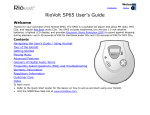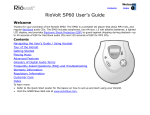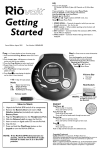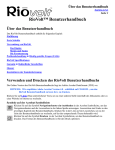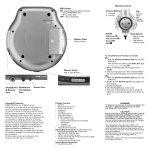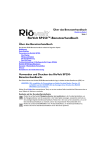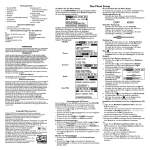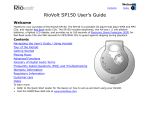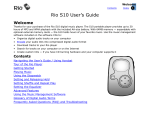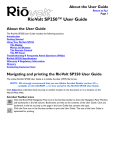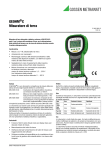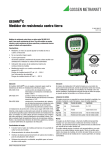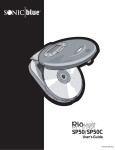Download Rio SP350 User`s guide
Transcript
Welcome Contents Index 1 RioVolt SP350 User’s Guide Welcome Thanks for your purchase of the RioVolt SP350, a portable CD player that plays WMA, MP3, and regular Red Book audio CDs. The SP350 includes headphones, a multifunction remote control, and rechargeable batteries to supply over 15 hours of continuous music playtime. The SP350 features a large backlit graphic LCD display, an FM tuner, and provides up to 480 seconds of Electronic Shock Protection (ESP) for Red Book audio CDs and 1920 seconds (32 minutes) for MP3/WMA CDs to eliminate skipping during playback. Use the music management software included on the software CDs to organize digital audio tracks on your computer, record (encode) your audio CDs, search for tracks on your computer or on the Internet, and create custom CDs—if you have CD burning hardware and your computer supports it. Contents Navigating the User’s Guide / Using Acrobat Safety Information Tour of the RioVolt - Buttons and Ports Tour (continued) - Display (LCD) Remote Control Getting Started Playing Music Listening to the Radio Advanced Functions Using the Music Management Software Glossary of Digital Audio Terms Frequently Asked Questions (FAQ) and Troubleshooting Warranty Information Welcome Contents Index 2 Regulatory Information Customer care Index To learn more: • Refer to the Quick Start poster for the basics on how to set up and start using your RioVolt. • Click the music management software Help menus for step-by-step instructions on how to use the included software. • Visit the SONICblue Web site at www.sonicblue.com. Navigating the User’s Guide RioVolt MP3/WMA >> CD Player This User’s Guide is in Adobe Acrobat (.PDF) file format. Important: We recommend that you use Adobe Acrobat Reader version 4.0 or higher to view and print the RioVolt User’s Guide. Acrobat reader 4.0 is available on the software CDs. Click blue, underlined text links to jump to another location in the document or to a location on the Internet. Click the Contents link at the top of any page to go to the list of User’s Guide contents. Click the Index link at the top of any page to go to the alphabetical Index of topics. Click page numbers in the Index to jump to a topic. Using Acrobat Click the navigation buttons in the Acrobat toolbar to go to the first page, previous page, next page, or last page of the User’s Guide. Click the print button in the Acrobat toolbar to print the User’s Guide. Click the show/hide navigation pane button in the Acrobat toolbar to show a list of bookmarks. Bookmarks are links to the contents of the User’s Guide. Click any bookmark in the list to jump to the page in the User’s Guide that contains the topic. Welcome Contents Index 3 Legal Notices © 2002 SONICblue Incorporated. All Rights Reserved. SONICblue Incorporated shall not be liable for any errors contained herein or for any damages arising out of or related to this document or the information contained herein, even if SONICblue has been advised of the possibility of such damages. This document is intended for informational and instructional purposes only. SONICblue reserves the right to make changes in the specifications and other information contained in this document without prior notification. SONICblue disclaims any obligation to update the information contained herein. Rio® is a registered trademark of SONICblue Incorporated. SONICblue and RioVolt are trademarks of SONICblue Incorporated. This product is iTunes ready. iTunes is provided by Apple Computer, Inc. Copyright © 2002 Apple Computer, Inc. All rights reserved. iTunes is a trademark of Apple Computer, Inc. Mac and the Mac logo are trademarks of Apple Computer, Inc. registered in the United States and other countries. RealOne is a trademark of RealNetworks, Inc. Microsoft, Windows Media and the Windows Logo are trademarks or registered trademarks of Microsoft Corporation in the United States and/or other countries. All other product names may be trademarks of the companies with which they are associated. First edition, August 2002 SP350 P/N 75510400-001 Important Safety Information WARNING TO REDUCE THE CHANCE OF SHOCK OR INJURY, DO NOT USE OR OPERATE THIS DEVICE IN OR NEAR WATER OR WET LOCATIONS. CAUTION RISK OF EXPLOSION, DAMAGE OR BATTERY LEAKAGE IS POSSIBLE IF BATTERY IS REPLACED INCORRECTLY OR BY AN INCORRECT TYPE. NEVER ATTEMPT TO CHARGE A NON-RECHARGEABLE ALKALINE BATTERY. DISPOSE OF USED BATTERIES ACCORDING TO INSTRUCTIONS OR LOCAL LAWS. Use of headphones while operating a vehicle is not recommended and is unlawful in some states and areas. Be careful and attentive while driving. Stop operation of the player if you find it disruptive or distracting while operating any type of equipment. Listening to music at full power over extended periods of time can be damaging to the hearing of the user. Class 1 Laser Invisible laser radiation when open and interlocks defeated, avoid exposure to beam. Tour of the RioVolt Contents Index 4 Tour of the RioVolt RioVolt MP3/WMA >> CD Player TRACKS/MENU Press to enter Tracks Navigation Mode; Press and hold to enter Menu Mode OPEN Press and slide to open the player DC IN Connects to AC Power Adapter LINE OUT Connects to powered speakers or car kit MULTIFUNCTION PORT Connects to headphones or remote control accessory Display (LCD) PLAY/PAUSE Press to play or pause playback; Press to turn on player REVERSE and FORWARD Press to skip to the previous or next track; Press and hold to scan forward or back through the current track; If a track is playing, press REVERSE to skip to the beginning of the current track STOP Press to stop playback; Press and hold to turn off player Lock/Unlock Switch Locks buttons to prevent accidental operation MODE/CD-FM Press to set Repeat/ Shuffle mode; Press and hold to toggle between CD and FM Tuner modes +10/-10 Press to skip forward or back 10 tracks; Press and hold to skip forward to the next or back to the previous directory VOLUME +/ - Press to adjust volume level LCD Contents Index 5 LCD Playback Mode Repeat/Shuffle Indicators Lock Indicator External Power Indicator Battery Indicator Shows remaining battery power. All three segments illuminated = a fully charged battery. Segments not illuminated = a run down battery. The battery indicator blinks when less than 20% battery life remains. Track Number Artist Name/CD Title/Directory Name Track Time/Volume Level/EQ Track Title Tracks Navigation Mode Playlist Directory Track Note: The highlighted cursor indicates the Directory is the currently selected option. Pressing the FORWARD button would allow you to navigate that Directory. LCD Contents LCD (cont.) Menu Mode Menu Option Selected Option Value RioVolt MP3/WMA >> CD Player Option Values FM Tuner Mode FM Indicator /Volume Level Preset Number FM Frequency Stereo Indicator Index 6 Accessories Contents Index 7 Accessories Remote Control 1 4 2 5 6 3 To use the remote control, plug the remote control cable into the MULTIFUNCTION PORT on the side of the RioVolt player, then plug the headphones into the remote. 1 VOLUME +/- Press to increase/decrease volume. 2 EQ/Function button (User Configurable) Press to toggle through the EQ presets or to use the feature you set in the RioVolt player’s Remote Btn. Menu option. To configure this button see “Remote Button” on page 14. 3 MODE/CD-FM Press to set Repeat/Shuffle modes; Press and hold to toggle between CD and FM Tuner modes. 7 4 FORWARD Press to skip to the next track; Press and hold to scan forward through the current track. REVERSE Press to skip to the previous track; Press and hold to scan back through the current track. 5 STOP Press to stop playback; Press and hold to turn off the player. 6 PLAY/PAUSE Press to play or pause playback. 7 LOCK/UNLOCK Slide into the LOCK position to stop the buttons on the remote from functioning. Note: To purchase optional accessories for the RioVolt SP350, visit our e-store. Getting Started Contents Index 8 Getting Started RioVolt MP3/WMA >> CD Player Unpack Make sure your player includes the following accessories: • Headphones • Two 1400mAH NiMH rechargeable batteries • AC Adapter • Remote Control • PC/Mac Software CDs • Carry Case • Car Kit (power and cassette adapters) • Quick Start Poster Insert Batteries 1 Press the OPEN button to release the latch and open the RioVolt player. 2 Remove the cardboard insert. 3 Remove the battery compartment cover on the inside of the RioVolt. 4 Insert the two supplied batteries. Ensure that the batteries are inserted properly by matching the + and - symbols on the battery with the symbols on the RioVolt. 5 Replace the battery compartment cover and close the RioVolt player. 6 Connect the supplied AC adapter to the DC In Jack on the side of the player, and into an electrical outlet. Let the batteries charge for approximately five hours before using the player. NOTE: To charge the batteries, the player must be turned off. The RioVolt will play CDs when plugged into the AC Adapter, but it can not charge the batteries while playing CDs. After the rechargeable batteries have been charged the first time, subsequent charges should only take approximately three to four hours to reach 100% capacity. Connect Headphones Connect the supplied headphones to the MULTIFUNCTION PORT on the side of the player. If you are using the remote control, plug the headphones into the remote control, then plug the remote control into the MULTIFUNCTION PORT. Tip: You can also use the LINE OUT jack to connect the player to an external audio system (cable not included) or the included Car Kit. Playing Music Contents Index 9 Playing Music Insert Disc 1 Slide the OPEN button to release the latch, and open the player. 2 Remove the cardboard insert. 3 Insert an audio CD or MP3/WMA CD into the player, label side up. 4 Close the CD cover. Note: The RioVolt can play CDs with the following logos: Play Disc 1 Press the PLAY/PAUSE button to turn on the player and begin playback. Note: There will be a short delay while the player loads your music tracks and track information. 2 Press the STOP button to stop playback. Press and hold STOP to turn off the player. Note: If the RioVolt does not power on when you press PLAY/PAUSE , check the LOCK/UNLOCK switch on the RioVolt and on the remote control to make sure they are both in the UNLOCK position. Listening to the Radio Contents Index 10 Listening to the Radio 4 Press STOP Switch to FM Tuner Mode RioVolt MP3/WMA >> CD Player 1 Press and hold the MODE/CD-FM button approximately 1.5 seconds to enter FM Tuner Mode. FM Indicator /Volume Level Preset Number FM Frequency to return to FM Tuner Mode. Note: Press and hold the PLAY/PAUSE button while in Preset Program mode to cause the RioVolt to scan through the entire FM frequency range and assign all 10 presets to the strongest FM stations. Using Presets 1 Press the TRACKS/MENU Preset Navigation Mode. button to enter FM Stereo Indicator The display switches to FM Tuner Mode, indicating the currently tuned frequency. 2 Press and hold the FORWARD button to scan forward or the REVERSE button to scan back through the FM frequencies. Setting Presets 1 Press the MODE/CD-FM button to enter Preset Program Mode. The preset text blinks in reverse video. 2 Press FORWARD and REVERSE to cycle through the Preset Numbers [P 01-10]. 3 Press PLAY/PAUSE to assign the current FM frequency to the displayed Preset Number. The preset FM frequencies and preset numbers are shown. Preset numbers are enclosed in brackets. When moving up and down through the preset list, each successive item is preceded by a cursor . 2 Press STOP to move down the preset list. Press PLAY/PAUSE to move up the list. 3 Press FORWARD to select a preset. The RioVolt tunes to the selected frequency. 4 Press the TRACKS/MENU button exit FM Preset Navigation Mode. Advanced Functions Contents Index 11 Advanced Functions Available advanced functions include: Repeat/Shuffle Track Navigation Menu Options Track Navigation Tracks Navigation Mode Regular audio CD (Red Book) Repeat/Shuffle Press the MODE/CD-FM button to set the player to one of the following Repeat/Shuffle modes: • SFL ALL — Plays all tracks in random order once, then stops. • SFL DIR — Plays all tracks in the current directory/playlist in random order once, then stops. • DIR — Plays all tracks in the current directory/playlist in the order they are on the CD or playlist, then repeats. • SFL DIR — Plays all tracks in the current directory/playlist in random order, then repeats. • 1 — Plays the selected track, then repeats. • SFL ALL — Plays all tracks on the CD in random order, then repeats. • ALL — Plays all tracks on the CD in the order they are on the CD, then repeats. • DIR — Plays all tracks in the current directory/ playlist in the order they are on the CD or playlist, then stops. Playlist Directory Track In Tracks Navigation mode the display shows the directories, playlists and tracks on the CD. Directory names and playlist names are enclosed in brackets ( [ ] ). If the directory, playlist or track information contains more characters than the display, the text scrolls from side to side. When moving up and down through a list, each successive item is preceded by a cursor . In the Display example shown above, the Directory has the highlighted cursor to indicate that it is the currently selected option. Pressing the FORWARD button would allow you to navigate that directory. 1 Press the TRACKS/MENU button to enter Tracks Navigation mode. The LCD shows directories, playlists, and track file names. 2 Press STOP to move down the list of directories or playlists. Advanced Functions Contents Press PLAY/PAUSE to move up the list of directories or playlists. 3 Press FORWARD to select a directory or playlist to navigate. The contents of the directory or playlist display. 4 Press STOP titles. to move down the list of track Press PLAY/PAUSE to move up the list. RioVolt MP3/WMA >> CD Player 5 Press FORWARD to select a track to play. The track begins playing. 6 Press the TRACKS/MENU button to exit Tracks Navigation mode. If no button is pressed for 10 seconds, the RioVolt exits Tracks Navigation mode. Track Navigation Mode MP3/WMA music CD 1 To set Menu options, press and hold the TRACKS/ MENU button for approximately 1.5 seconds to enter Menu Mode. Menu Mode Menu Option Selected Option Value Option Values 2 Press PLAY/PAUSE or STOP to navigate up and down through the list of available Menu options. to select a Menu option. 4 Press PLAY/PAUSE or STOP to navigate between settings for the Menu option The selected Menu option setting is indicated by an asterisk When an MP3 or WMA CD is loaded in the RioVolt, playlist names appear enclosed in brackets, as do directories. Use the navigation controls to navigate within directories or playlists and to select tracks to play. 12 Menu Options 3 Press FORWARD Playlists Index *. 5 Press FORWARD to select a Menu option setting. Press REVERSE to return to the main Menu options list without changing the setting. 6 From the main Menu options list, press REVERSE to exit Menu mode. Advanced Functions Contents Index 13 Equalizer (EQ) Backlight Choose from the following EQ presets: Backlight controls how long the backlight stays on after a button is pressed. Backlight options include: • OFF • 1 second (default) • 5 seconds • 10 seconds EQ Preset Bass Settings Treble Settings Normal (Default) 0 0 Classic +2 +2 Scan Speed Pop +3 +3 Jazz +2 +3 Rock +4 +3 Bass/Rap +5 0 Scan Speed adjusts the speed at which the RioVolt scans forward or backward through a track as you hold down the REVERSE or FORWARD buttons. Scan Speed options include: • 2x (default) • 4x • 8x User Set by Bass and Treble menu options Resume If Resume is ON, when the RioVolt is powered on it resumes playing the track it was playing when the RioVolt was powered off. If Resume is OFF, when the RioVolt is powered on it begins playing the first track on the CD. Resume options include: • ON — Enables the resume function (default). • OFF — Disables the resume function. Scroll Speed Scroll Speed adjusts the speed at which the ID3 tag and file information scroll from side to side on the display. Scroll Speed options include: • 1x (default) • 2x • 4x Beep Beep controls whether or not an audible beep is heard when buttons are pressed. Beep options include: • ON — Enables the beep capability (default). • OFF — Disables the beep capability. Advanced Functions Contents 14 ID3 (Tag Display) Bass ID3 controls whether or not the RioVolt displays ID3 tag information while a track is playing. ID3 options include: • ON — Shows ID3 tag information on the display while a track is playing (default). • OFF — Displays only the file name. The Bass setting allows you to control the low frequency range of the sound spectrum from -7 (no bass) to +7 (maximum bass). The default value is CD ESP This feature allows you to determine the function of the EQ/Function button located on the remote control. The options are: • EQ — (Default) Operates as an EQ button, toggling the EQ Presets. • +10/+Dir — Operates as the +10 button when pressed, skipping 10 tracks forward; When pressed and held, skips to the next directory on the CD. • -10/-Dir — Operates as the -10 button when pressed, skipping 10 tracks back; When pressed and held, skips to the previous directory on the CD. The CD ESP (Electronic Shock Protection) feature controls how much music is buffered (stored in memory to prevent skipping) during CD playback. RioVolt MP3/WMA >> CD Player Index CD Audio MP3/WMA ON (Default) 480 seconds 1920 seconds OFF 160 seconds NOTE: ESP is always active during MP3/ WMA playback regardless of the CD ESP setting. Treble The Treble setting allows you to control the high frequency range of the sound spectrum from -7 (no treble) to +7 (maximum treble). The default value is 0. Press PLAY/PAUSE or STOP to adjust the treble setting. 0. Press PLAY/PAUSE setting. or STOP to adjust the bass Remote Button Advanced Functions Contents Defaults The Defaults feature automatically resets all Menu options to their default settings. Default options include: • Reset — Displays a confirmation screen (see below). • Cancel — Leaves settings unchanged. If Reset is selected, the Menu option displays “Confirm?” and a second set of confirmation options: • Yes — Resets all Menu options to their default values. • No — Leaves settings unchanged. Setting Default Value EQ Normal Resume ON Backlight 1 second Scan Speed 2x Scroll Speed 1x Beep ON ID3 Tag Info ON CD ESP 480 seconds Treble 0 Bass 0 Remote Btn. EQ Defaults Cancel Index 15 Using the Music Management Software Contents Index 16 Using the Music Management Software This section is an introduction to the music management software included on the CDs. RealOne (PC) MoodLogic (PC) iTunes (Mac) Installing the Software RioVolt MP3/WMA >> CD Player PC 1 Place the software CD label side up into your computer’s CD-ROM drive. After a few seconds, the install screen will display. 2 Click the “Install” link of the music management software that you would like to install, then follow the on-screen instructions. You can also choose to view the User’s Guide, get support or register your RioVolt online. 3 Reboot your computer when the software installation is complete or you are prompted to do so. Note: If the install screen does not display automatically, follow these steps to begin the installation manually: 1 Click the START button in the bottom-left corner of your computer screen and choose RUN... 2 Type d:\install.exe in the field labeled OPEN. If your computer’s CD-ROM drive uses a letter other than “d”, substitute that letter for “d”. 3 Click the OK button and follow the on-screen instructions. Mac 1 Place the software CD label side up into your computer’s CD-ROM drive. 2 The CD contents should display automatically. To manually display the CD contents, double-click the Rio icon on your computer’s desktop. 3 Double-click the Install icon. 4 After a few seconds, the Rio splash screen will display. 5 Click the “Install iTunes” link, then follow the on-screen instructions to install the software. You can also choose to view the User’s Guide, get support or register your RioVolt online. 6 Reboot your computer when the installation is complete. Using the Music Management Software Contents Index 17 Using RealOne (PC) RealOne music management software is included on the PC software CD. Use RealOne to: • Save (encode) your audio CDs into compressed digital audio formats like MP3. • Organize digital audio tracks on your computer. • Search for tracks on your computer or on the Internet. • Create a custom CD—if you have CD burning hardware and your computer supports it. To Learn More About Using RealOne Please see the RealOne Help menu for detailed information on using RealOne. 1 Click the software Help menu. 2 Select Help Contents, Getting Started Guide, or Tutorial. Setting Preferences You can set Preferences to control, for example, the sample rate for encoded tracks, or if you want RealOne to automatically save (encode) audio CDs while they play. Please see the RealOne Help for more information about Preferences. To open the Preferences window you can either: • Click the Tools menu and select Preferences. • Click Preferences at the bottom of the Real One window. RealOne Preferences Window Using the Music Management Software Contents Index 18 RioVolt MP3/WMA >> CD Player Saving an Audio CD 1 Start the RealOne software. 2 Put an audio CD in your computer’s CD-ROM drive. If the Prompt To Save CD preference is enabled (under Preferences > CD), RealOne displays a dialog box asking if you wish to save the CD. If you select Yes, RealOne starts saving (encoding) all tracks on the CD. If this preference is not enabled, continue with Step 3. 3 After a few seconds, CD and track information display. 4 Click Save Tracks at the bottom of the window. A dialog box displays, where you can select individual tracks, or select all tracks by clicking the Check All button. Click OK when you are done. 5 RealOne starts saving the selected tracks into compressed digital audio format. Click the Help Menu to Learn More RealOne CD Window Click to Set Preferences Click to Save Tracks Using the Music Management Software Contents Burning a Digital CD If you have a CD-R or CD-RW drive and your computer supports CD-ROM writing, you can use the RealOne software with its Easy CD Creator plugin software from Roxio to create your own digital audio CDs. 1 Start the RealOne software. 2 Click on the Devices tab at the bottom of the screen. 3 Click the box next to Data at the bottom of the screen. Note: If Audio is selected instead of Data, the digital audio files will be burned on the CD as WAV files, which are much larger and take more memory, and more space on the CD. Selecting Data maintains the MP3 or WMA compression and allows you to store up to 999 songs on a single CD. 4 Click Add Clips at the bottom-left corner of the screen. The Real One Add File screen pops up and lists all of the digital audio files you have on your computer. 5 Highlight the digital audio files you want to include on your CD. 6 Click Burn CD. Note: For additional information on using RealOne to burn CDs, refer to the RealOne Online Help. Index 19 RealOne Devices Window Devices Tab Audio/Data: Click to choose CD format Add Clips: Click to add music files Burn CD: Click to start CD writing Using the Music Management Software Contents Index 20 RioVolt MP3/WMA >> CD Player Using MoodLogic (PC) MoodLogic software helps you manage your digital audio collection. Your RioVolt package includes a free 100 track version of MoodLogic client software. Use MoodLogic to: • Identify your songs regardless of file names and tags. • Auto-classify your songs by genre, mood, tempo, and more. • Auto-correct your file tags. • Build instant playlists filled with songs that match your mood. • Explore and sample new songs that are similar to your favorites. • Share song profiles with other users. For more information about MoodLogic, including a tutorial, tips & tricks, and FAQ, visit the MoodLogic Web site. Note: Your RioVolt SP350 supports Moodlogic playlists. Choose “Export to .m3u” to create an instant music mix to use the RioVolt’s playlist feature. MoodLogic Window Using the Music Management Software Contents Index 21 Using iTunes (Mac) iTunes music software takes the confusion out of managing your personal music collection. iTunes turns your Mac into a powerful digital jukebox, complete with easy-to-use tools for recording music from audio CDs (simply insert a CD to import music to MP3s), searching and browsing your entire collection, managing playlists, and listening to Internet radio stations. To Learn More About Using iTunes • From within the software, click the Help menu and choose iTunes Help or • Visit the iTunes Web site. iTunes Software Screen Glossary of Digital Audio Terms Contents Index 22 Glossary of Digital Audio Terms Bass Bass is the particular low-range area of the sound spectrum where low musical notes and sounds are located. Increasing the bass value will make the low vocals and drums more prominent in your music. Adjusting this level too high can cause distortion at high volumes in some music files. RioVolt MP3/WMA >> CD Player Bitrate Bitrate denotes the number of bits per second used to represent a digital music file. The size and quality of a compressed digital audio file is determined by the bitrate used when encoding the file. The higher the bitrate used, the higher the sound quality, and the larger the file size. For example, with MP3, a bitrate of 128kbps (128,000 bits per second) is generally thought of as “CD quality”, and takes up about 1 megabyte (MB) per minute of music. At a 64kbps bitrate, the sound quality is similar to that of an FM radio signal, but you can get approximately two minutes of music in that same 1MB of storage space. CD audio has a bitrate of 1.4Mbits per second (1,400,000 bits/second). Codec Depending on the context and kind of technology involved, codec can be defined as a compressed digital audio file format (like MP3, WMA, and so on), a “coding/decoding” chip used to translate between digital and analog transmissions (used in modems), or a compression/decompression algorithm. Codecs compress audio data into a file, often for efficient transmission over a network, and then decode it for playback. While all the codecs perform similar compression of digital audio, there are differences in the technology. The RioVolt supports the following digital audio codecs: • MP3 • WMA • CD Audio (Red Book) Glossary of Digital Audio Terms Contents Encoding, or “ripping” and encoding Encoding, sometimes referred to as “ripping” and encoding, refers to extracting audio from a music CD (ripping), and converting it (encoding) into a compressed digital audio format like MP3 or WMA. Firmware Firmware is software—programs or data—that has been written onto read-only memory (ROM). Firmware is a combination of software and hardware that is comparable to an operating system on a computer. The RioVolt firmware controls everything from the liquid crystal display and codec support to the RioVolt’s other functions. Upgrading the RioVolt firmware ID3 Tag The ID3 tag is the part of the encoded MP3 file that contains information about the digital music file such as song title, artist, album title, encoding bitrate, track time duration, and so on. MP3 MP3 is short for Moving Pictures Experts Group Audio Layer 3. MP3 is the most well known compressed digital audio file format. This format allows for near “CD quality” sound, but at a fraction of the size of normal audio files. MP3 conversion of an audio track from CD-ROM reduces the file size by approximately a 12:1 ratio with virtually no perceptible loss in quality. This digital sound encoding and compression process was developed by the Fraunhofer Institut fur Integrierte Index 23 Schaltungen and Thomson Multimedia. MP3 compression removes the redundant and irrelevant parts of a sound signal that the human ear doesn't hear. The MP3 encoding process is well suited for the transfer of high quality audio files with small file size over the Internet. Red Book The specification for audio (CD-DA) compact discs. Treble Treble is the high notes of the sound spectrum. Increasing the treble value will raise the levels of the high sounds in your music files. VBR Variable Bitrate (VBR) encoding converts tracks at a variable rate, using higher bitrate encoding for complex portions and lower bitrate encoding for pauses in songs. WMA Windows Media Audio (WMA) is the compressed audio format created by Microsoft as an alternative to MP3. WMA offers greater file compression than MP3, enabling you to store more music on your PC or writable CDs. Frequently Asked Questions (FAQ) Contents Index 24 Frequently Asked Questions (FAQ) What type of CDs can I play with the RioVolt? You can play CDs that have MP3 and/or WMA music files or you can play regular CD audio music discs. Can I mix CD Audio with MP3 and/or WMA files? No. You can play either CD Audio discs or CDs with MP3/WMA music content. They cannot be mixed together. Can I put both MP3 and WMA files on the same CD? Yes. You can play a CD with both MP3 and WMA files and can choose tracks however you like. RioVolt MP3/WMA >> CD Player What are the differences between MP3 and WMA? If you use the WMA format instead of the MP3 format, your files are at about one half the size. Since WMA offers a smaller file size than MP3, it enables you to store more music on your PC or on your writable CDs. WMA files are exclusive to the PC. What is the maximum number of songs I can put on a single CD? You can store up to 999 music tracks per CD depending on the size of the music tracks and the available space on your CD-R/RW. Will the RioVolt play Variable Bitrate (VBR) files? There is no standard for VBR files, so we cannot guarantee that every encoding software package will properly function with the RioVolt. However, most VBR MP3 music files will play properly on your RioVolt. Where is the battery indicator on my RioVolt? The battery indicator on the RioVolt is located in the top-right corner of the display. The segments in the battery icon show the remaining battery power. All four segments illuminated = a fully charged battery. Segments not illuminated = a run down battery. The battery indicator blinks when less than 20% battery life remains. Frequently Asked Questions (FAQ) Contents Index 25 What kind of skip protection is there on the RioVolt? The RioVolt uses Electronic Shock Protection (ESP) to help prevent skipping during playback. When playing MP3/WMA files, you get up to 1920 seconds (32 minutes) of skip protection. When playing Red Book Audio CDs, you have the option of up to 480 seconds of skip protection. How does skip protection work? When the player first starts, a buffer is filled with the track data. The CD stops spinning, and the tracks continue to play out of memory, which helps conserve battery life. When about 30 seconds of time remains in the buffer, the CD will again spin up and refill the buffer. Note that during this time, if the RioVolt is jarred so that the buffer cannot be filled — for example, when jogging or riding a bicycle — then the player may begin to skip. You will need to let the buffer fill in order to have skip-free performance. What kind of batteries can I use with my RioVolt? The RioVolt SP350 only uses rectangular 1400mAH NiMH batteries. Do not use alkaline batteries. How much playtime can I get from 2 NiMH batteries? Playtime varies with battery type and music content. However, as a guideline the following applies: MP3/ WMA CDs have up to 15 hours of music playtime. Audio CDs will have up to 6 hours of playtime with ESP on and 8 hours with ESP off. The CD seems to stop spinning during playback. Is this normal? Yes, it is normal for the CD to stop spinning during playback. This is part of the skip protection and battery life protection. When the CD is stopped, the Riovolt plays songs from memory. This serves as absolute shock protection during this time, as the disc is not even spinning. Frequently Asked Questions (FAQ) Contents Index 26 How do I upgrade the RioVolt firmware? Downloading the firmware upgrade from the Web site 1 2 3 4 Go to the SONICblue Web site at www.sonicblue.com. Click the Support link. Navigate to the Rio Technical Support Updates page. Select and download the latest RioVolt xxx.exe (PC), RioVolt Update xxx.hqx (Mac) or RioVolt xxx.zip (for other operating systems, such as Linux) firmware upgrade file to your computer. Note: Please see the text file included with the firmware update for instructions and additional assistance. Upgrading the RioVolt firmware RioVolt MP3/WMA >> CD Player 1 Burn the unzipped file onto a Data CD with your CD-ROM Writer. NOTE: The RioVolt will not play music contained on a CD that also has the firmware upgrade. 2 Place the CD in the RioVolt, and press the PLAY/PAUSE button to start the RioVolt. The RioVolt player will find the firmware, upgrade itself, and then turn off. During the upgrade, the RioVolt display shows the startup screen and replaces the flashing text “READING TRACKS” with the flashing text “UPGRADING” and the text “VERSON 1.0" with the text “SP350 WILL POWER OFF WHEN COMPLETE”. 3 Remove the CD from the RioVolt. The upgrade is complete. You may now resume using your RioVolt player. Troubleshooting Contents Index 27 Troubleshooting Problem Solution I am only able to fit 10-15 songs on a CD-R or CD-RW for my RioVolt. If you are only able to fit 10-15 songs on a CD-R or CD-RW for use in your RioVolt, then it is likely you are creating the CD in audio or .wav format instead of data format. You should be able to fit hundreds of tracks onto one CD. Consult the documentation that came with your burning software for further assistance with this. After creating a CD using DirectCD the RioVolt will not read it properly. If the RioVolt is having trouble reading a CD created using DirectCD, make sure that the CD is formatted with compression OFF. If compression is ON, the RioVolt will not read the tracks properly. Check the documentation that came with your burning software for further assistance with this. I am unable to power up the RioVolt. This happens when using new batteries or the AC power adapter. Be sure that the LOCK/UNLOCK switch on the RioVolt is set to UNLOCK. If the LOCK/UNLOCK switch is in the LOCK position, you will be unable to power up the unit. Place the LOCK/UNLOCK Switch to the UNLOCK position and press the PLAY/ PAUSE button to power up the RioVolt. The RioVolt is working with batteries, but when I plug in the AC adapter it does not work. Be sure that the AC Adapter is plugged into the proper connection. You may be plugging the AC Adapter into the Line-out connector on the RioVolt. If you are still experiencing problems, be sure the LOCK/UNLOCK switch on RioVolt is set to UNLOCK. Troubleshooting RioVolt MP3/WMA >> CD Player Contents Problem Solution My RioVolt gives a “No Disk” error message when spinning up. • • • • • • • • • • • I can’t play my WMA files. Index 28 To resolve the “No Disk” error message, try the following: Make sure the CD is seated properly in the tray. See if a standard audio CD functions properly. Try a CD created with standard MP3/WMA files encoded at 128kbps, NOT variable bitrate (VBR) files. Try burning to a different media or brand of media. Try burning a CD from another CD burner. See if burning at a slower rate (say 2x or slower) makes the files load properly. Try closing the CD volume when you create the disc. Try cleaning the lens with a cotton swab. If you are using a Macintosh to burn your CDs, make sure the .mp3 extension is at the end of each file. Some versions of Mac software do not include this extension, and these files cannot be read by the RioVolt. If you are getting this message when attempting to update the firmware, make sure the firmware file on the root of the CD is named correctly. The firmware update readme.txt file contains specific file name and firmware upgrade instructions. The RioVolt does not read Secure WMA files. Secure WMA files are created to prevent theft and illegal copying of the files. • In Windows Media Player, go to Tools > Options. • On the CD Audio tab, un-check the “Enable Personal Rights Management” box. • Re-create the WMA files and burn them to CD. They should play fine on the RioVolt. Troubleshooting Contents Index 29 Problem Solution I get an error message when I start encoding a CD. The following factors may interfere with the CD encoding process: • Over-utilization of the CPU during the encoding process. Close all other software before encoding. • Insufficient RAM to cache the track properly. Generally, 64 MB is fine if no other memory-intensive application is running. Close all other software before encoding. • CD-ROM firmware. Even if a CD-ROM drive is new, it may require a firmware update from the manufacturer to correct audio extraction errors. • Overclocking. Overclocking the system—running it faster than it is rated to run—can have adverse effects on peripheral components. If your system is overclocked, bring it back to its normal operating speed. Limited Warranty Contents Index 30 Limited Warranty Our warranty to you SONICblue Incorporated warrants that your product will be free from defects in materials and workmanship for a period of one year from the date of original retail purchase. SONICblue Incorporated warrants refurbished products, marked and sold as such, for ninety (90) days from the original purchase date. This warranty is extended to the original end user purchaser only and is not assignable or transferable to any other party. Product failures not covered by this warranty This warranty does not cover damage caused by abuse, misuse, unauthorized attempts to open, modify, or repair the product, moisture, extreme heat or cold, corrosive environments, shipping, or high voltage surges from external sources such as power line, telephone line, or connected equipment. This warranty does not cover wear and tear on covers, housing or wiring. This warranty also does not apply to any product with an altered or defaced serial number. RioVolt MP3/WMA >> CD Player Remedies If you discover a defect covered by this warranty, SONICblue Incorporated will repair or replace the product at our sole discretion using new or remanufactured product or components. SONICblue Incorporated's liability is limited solely to the repair or replacement of the defective product. If SONICblue Incorporated cannot reasonably repair or replace the defective product then SONICblue Incorporated may, at its sole discretion, refund the purchase price paid for the product. SONICblue Incorporated warrants any replaced or repaired product for a period of ninety (90) days from shipment, or through the end of the original warranty period, whichever is longer. How to obtain warranty service To obtain service under this warranty, you must contact a SONICblue Incorporated Customer Care Center within the applicable warranty period to receive a warranty service authorization. You will be required to provide a dated original proof of purchase. Products shipped to SONICblue Incorporated must be shipped postage-paid and packaged appropriately for safe shipment. SONICblue Incorporated is not responsible for products received without a warranty service authorization and may be rejected. Repaired or replacement products will be shipped to you at SONICblue Incorporated's expense. All products or parts that are replaced become the property of SONICblue Incorporated. Limits of liability SONICblue Incorporated's liability is limited to the repair or replacement of this product. In no event will SONICblue Incorporated be liable for any amount greater than the currently suggested retail price of this product. We will not be liable to you or anyone else for any damages that result from the failure of this product or from the breach of any express or implied warranties. These include damage to other equipment, lost data, lost profits, or any consequential, incidental, or punitive damages. This written warranty represents the entire warranty agreement between SONICblue Incorporated and you. This warranty is given in lieu of all other warranties, express or implied, including without limitation implied warranties of merchantability and fitness for a particular purpose. This warranty is limited to the term specified above. No warranties, either express or implied, will apply after this period. This warranty may not be altered in any way other than in writing by an officer of SONICblue Incorporated. This warranty gives you specific legal rights and you may also have other rights, which vary, from state to state. Some states limit what warranties may be excluded as well as how long an implied warranty lasts, so the above limitation may not apply to you. Regulatory Information Contents Index 31 Regulatory Information Federal Communications Commission (FCC) This device complies with Part 15 of the FCC Rules. Operation is subject to the following two conditions: 1 This device may not cause harmful interference, and 2 This device must accept any interference received, including interference that may cause undesired operation. NOTE: This equipment has been tested and found to comply with the limits for a Class B digital device, pursuant to Part 15 of the FCC Rules. These limits are designed to provide reasonable protection against harmful interference in a residential installation. This equipment generates, uses and can radiate radio frequency energy and, if not installed and used in accordance with the instructions, may cause harmful interference to radio communications. However, there is no guarantee that interference will not occur in a particular installation. If this equipment does cause harmful interference to radio or television reception, which can be determined by turning the equipment off and on, the user is encouraged to try to correct the interference by one or more of the following measures: • Reorient or relocate the receiving antenna. • Increase the separation between the equipment and receiver. • Connect the equipment into an outlet on a circuit different from that to which the receiver is connected. • Consult the dealer or an experienced radio/TV technician for help. Industry Canada This Class B digital apparatus complies with Canadian ICES-003. Cet appareil numérique de la classe B est conforme à la norme NMB-003 du Canada. Customer Care Contents Index 32 Customer Care Web Site http://www.sonicblue.com/support E-mail [email protected] RioVolt MP3/WMA >> CD Player Technical Support Telephone Call for answers to technical questions about your product. (503) 453-1640 Customer Service Telephone Call for sales and general product information. (800) 468-5846 Hours Please check the support Web site for the current hours of operation. Rio Product Support With every Rio product you receive the following support services: • Unlimited access to the Rio web-based technical information resources, available 24 hours a day every day at http://www.sonicblue.com/support. Here you will find FAQ files, product updates, and other useful information. • Unlimited e-mail support for the duration of your Rio product hardware warranty period. • Access to the latest software updates and enhancements for Rio products via our Web site. Index Contents 33 Index Symbols +10 / - 10 control 4 A AC Adapter 8 audio file size 22 B backlight menu option 13 bass definition 22 menu option 14 battery indicator 5 installation 8 replacement 25 beep menu option 13 bitrate definition 22 buttons and controls 4 C CD ESP menu option 14 CDs burning 19 saving 18 codec definition 22 MP3 23 WMA 23 common questions 24 configurable remote button 14 copyright/trademark information 3 customer care 32 D DC in jack 4 default settings 15 defaults menu option 15 E electronic shock protection (ESP) 14, 25 encoding definition 23 equalizer (EQ) menu option 13 F Federal Communications Commission (FCC) 31 firmware definition 23 downloading from Web site 26 upgrading 26 FM tuner mode 10 setting presets 10 using presets 10 forward button 4 frequently asked questions (FAQ) 24 G getting started 8 H headphone jack 4 I ID3 menu option 14 ID3 tag definition 23 important safety information 3 Industry Canada 31 installing the software 16 iTunes software 21 L legal notices 3 limited warranty 30 line out jack 4 Linux 26 liquid crystal display (LCD) 5 listening to the radio 10 lock/unlock switch 4 M Mac software 21 menu options 12 mode/CD-FM button 4 MoodLogic software 20 MP3 definition 23 multifunction port 4 music management software 16 P PC software 17 play/pause button 4 playing music 9 presets numbers 10 program mode 10 R RealOne software 17 red book definition 23 regulatory information 31 remote button menu option 14 remote control 7 repeat/shuffle modes 11 restoring menu option defaults 15 resume menu option 13 reverse button 4 ripping and encoding 23 S safety information 3 scan speed menu option 13 scroll speed menu option 13 setting menu options 12 setup instructions 8 skip protection 25 software installation instructions 16 Index Contents 34 stop button 4 T technical support 32 track navigation 11 tracks/menu button 4 treble definition 23 menu option 14 troubleshooting 27 U upgrading firmware 26 V RioVolt MP3/WMA >> CD Player variable bitrate (VBR) definition 23 volume + / - control 4 W warranty 30 WMA definition 23


































